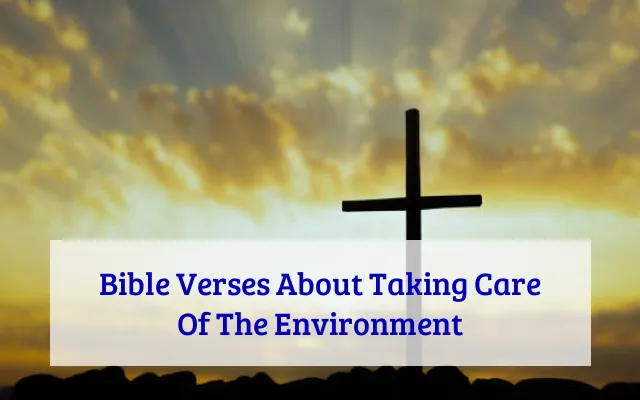Friends, if you’re looking for “Bible Verses About Taking Care Of The Environment,” this content is for you. Today, I share Bible verses that will really help you better understand environmental stewardship according to the Bible. These scriptures highlight our responsibility as caretakers of God’s creation, emphasizing the importance of preserving and nurturing the natural world. Let’s explore what the Word says about our role in protecting and respecting the environment God has entrusted to us.
Contents
- 1 What Does the Bible Say About Environmental Stewardship?
- 2 Old Testament Verses About Caring for God’s Creation
- 3 New Testament Teachings on Environmental Responsibility
- 3.1 Matthew 6:26 – Trust in God’s provision, nature reflects His care
- 3.2 Romans 8:19-21 – Creation awaits freedom, reflecting hope for renewal
- 3.3 Colossians 1:16 – All creation made through and for Christ
- 3.4 Hebrews 1:3 – Christ sustains creation with powerful word
- 3.5 1 Corinthians 10:26 – The earth belongs to the Lord
- 4 Biblical Principles for Protecting Nature and Wildlife
- 4.1 Proverbs 12:10 – Righteous care for animals reflects a compassionate heart
- 4.2 Job 12:7-10 – Nature teaches God’s sovereignty over life
- 4.3 Psalm 50:10-11 – God owns and cares for all creation
- 4.4 Psalm 104:25-30 – God’s care sustains and renews all creation
- 4.5 Isaiah 11:6-9 – Peaceful harmony among all creatures in creation
- 4.6 Ezekiel 34:18 – Neglecting nature’s care harms others and the environment
- 5 How Christians Should Respond to Climate Change According to Scripture
- 5.1 Jeremiah 2:7 – God’s land defiled, responsibility to protect creation
- 5.2 Isaiah 24:5-6 – Earth’s defilement due to broken divine laws
- 5.3 Psalm 104:30 – God renews the earth through His Spirit
- 5.4 Romans 1:20 – God’s creation reveals His eternal power and nature
- 5.5 Revelation 11:18 – God will destroy those who harm the earth
- 6 Bible Verses About Being Good Stewards of Natural Resources
- 6.1 Proverbs 27:18 – Care for resources; reap rewards
- 6.2 Proverbs 28:19 – Hard work leads to abundance, neglect leads to poverty
- 6.3 Isaiah 5:8 – Warning against greed; preserve land for all
- 6.4 Matthew 25:21 – Faithful stewardship rewarded with greater responsibilities
- 6.5 Luke 16:10-12 – Faithfulness in small matters leads to greater responsibility
- 6.6 Deuteronomy 22:6-7 – Care for birds and their nests
- 7 God’s Command to Preserve and Protect the Earth
- 8 Biblical Examples of Environmental Conservation and Care
- 8.1 Exodus 23:10-11 – Let land rest, providing for poor and wildlife
- 8.2 Leviticus 25:1-7 – Land rests every seventh year, promoting renewal
- 8.3 2 Chronicles 36:21 – Land rested during exile, fulfilling prophetic sabbath
- 8.4 Nehemiah 10:31 – Honor sabbath; preserve land’s resources and rest
- 8.5 Jonah 4:11 – God’s care extends to all creation
- 8.6 Psalm 65:9-13 – God’s provision nourishes and enriches the earth
What Does the Bible Say About Environmental Stewardship?
When we talk about stewardship from a biblical perspective, it’s about recognizing that everything we have is a gift from God, including our environment. We are entrusted with the care of the earth, much like a gardener tending a beautiful garden. This responsibility invites us to act with love and respect, ensuring we leave the world better for future generations. Let’s explore some verses that highlight this divine duty.
Genesis 2:15 – Care for and maintain God’s creation

The Lord God took the man, put him into the garden of Eden to dress it to keep it
Genesis 2:15
Explanation:- This verse highlights humanity’s responsibility to nurture and protect the earth. It underscores the biblical principle of environmental stewardship, reminding us that caring for creation is a sacred duty entrusted to us by God, reflecting respect and gratitude for His gifts.
Psalm 24:1 – The earth belongs to God; all within it
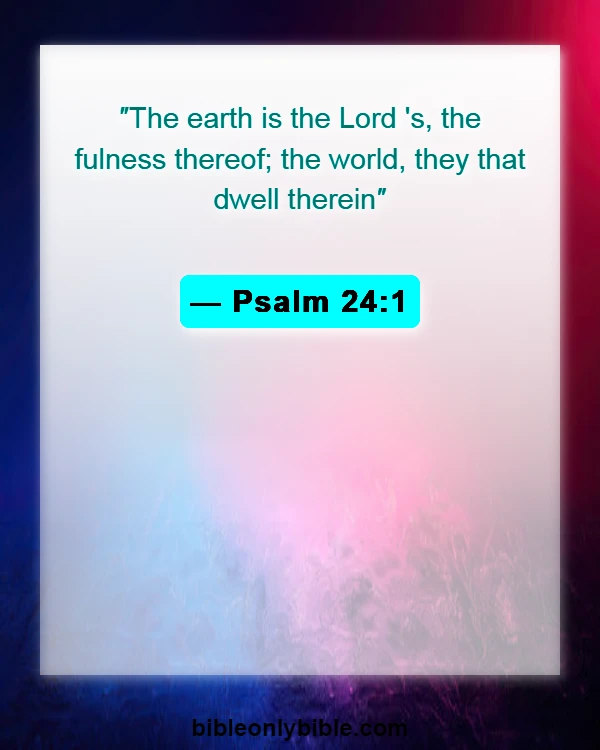
The earth is the Lord ‘s, the fulness thereof; the world, they that dwell therein
Psalm 24:1
Explanation:- This verse underscores that everything on earth is God’s creation, highlighting our responsibility to care for it. As stewards of His creation, we are called to protect and preserve the environment, acknowledging that it belongs to God and respecting its sanctity.
Old Testament Verses About Caring for God’s Creation
The Old Testament is rich with imagery and teachings that remind us of our role in caring for the earth. These scriptures invite us to see the world as God’s creation, a masterpiece that we are privileged to nurture. By reflecting on these ancient texts, we find timeless guidance on how to honor our Creator through the care of His creation.
Genesis 1:26 – Humans entrusted to steward God’s creation responsibly
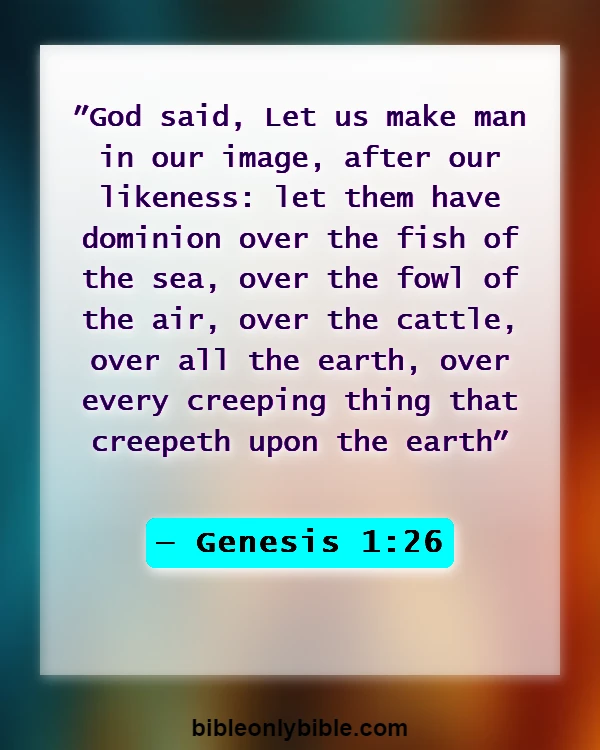
God said, Let us make man in our image, after our likeness: let them have dominion over the fish of the sea, over the fowl of the air, over the cattle, over all the earth, over every creeping thing that creepeth upon the earth
Genesis 1:26
Explanation:- Genesis 1:26 highlights humanity’s responsibility to care for the Earth. As stewards of God’s creation, humans are entrusted with the duty to manage and protect the environment, reflecting divine authority and wisdom in all interactions with nature.
Genesis 1:28 – Stewardship and dominion over Earth’s creatures and resources
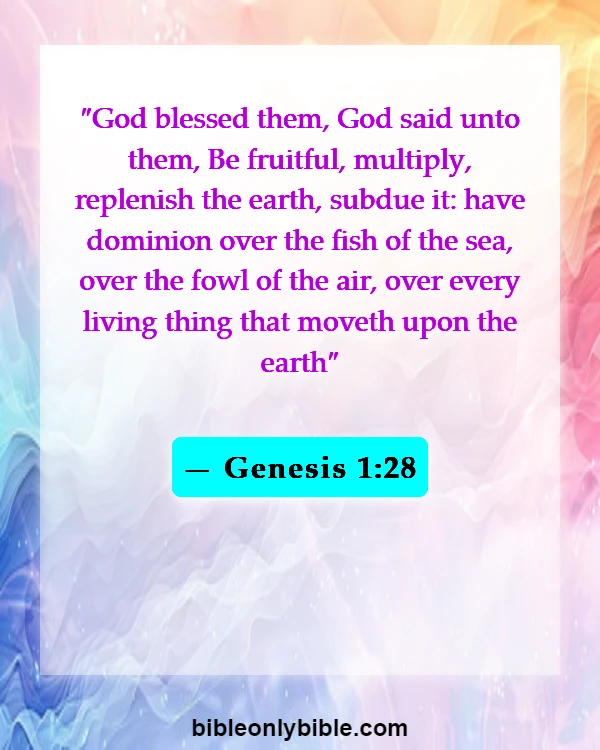
God blessed them, God said unto them, Be fruitful, multiply, replenish the earth, subdue it: have dominion over the fish of the sea, over the fowl of the air, over every living thing that moveth upon the earth
Genesis 1:28
Explanation:- In Genesis 1:28, God grants humans the responsibility to steward and care for the Earth, emphasizing stewardship and respectful dominion over its creatures and resources. This verse highlights our duty to protect and nurture the environment as caretakers of God’s creation.
Leviticus 25:23-24 – Land belongs to God, treat it responsibly
The land shall not be sold for ever: for the land is mine, for ye are strangers sojourners with meAnd in all the land of your possession ye shall grant a redemption for the land
Leviticus 25:23-24
Explanation:- These verses remind us that the land is ultimately God’s property, and we are merely stewards. As caretakers, we must treat the environment responsibly, recognizing our role in preserving and respecting God’s creation for future generations.
Deuteronomy 11:12 – God watches over the land all year
A land which the Lord thy God careth for: the eyes of the Lord thy God are always upon it, from the beginning of the year even unto the end of the year
Deuteronomy 11:12
Explanation:- This verse highlights God’s constant care and attention to the land, reflecting the importance of stewardship over His creation. It reminds us to responsibly care for the environment, knowing it is under God’s watchful eye throughout the year.
New Testament Teachings on Environmental Responsibility
The New Testament encourages believers to live lives that reflect Christ’s teachings, which include caring for the world around us. By following Jesus’ example of love and service, we are called to extend that care to the environment. These teachings remind us that our faith is interconnected with how we treat the earth and all living things.
Matthew 6:26 – Trust in God’s provision, nature reflects His care
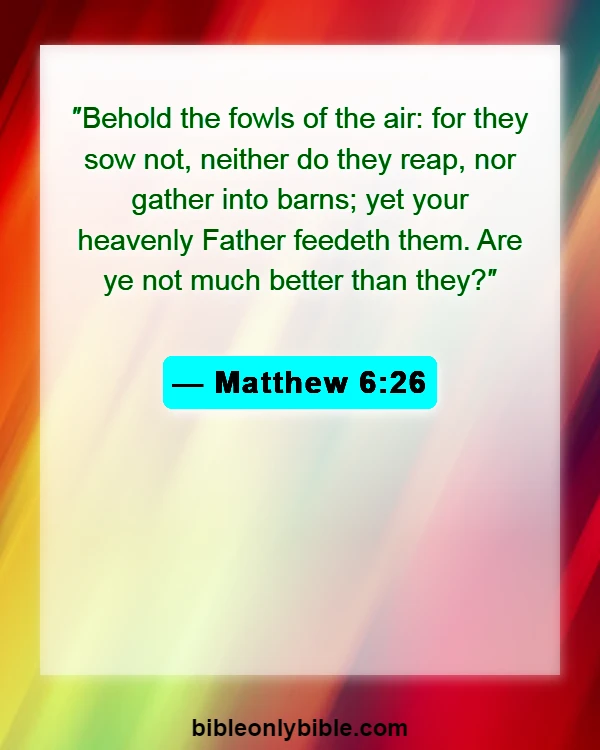
Behold the fowls of the air: for they sow not, neither do they reap, nor gather into barns; yet your heavenly Father feedeth them. Are ye not much better than they?
Matthew 6:26
Explanation:- This verse highlights how God provides for the birds, underscoring His care for all creation. It encourages trust in His provision and suggests that, as stewards of the Earth, we should responsibly care for the environment, reflecting His love and care for nature.
Romans 8:19-21 – Creation awaits freedom, reflecting hope for renewal
For the earnest expectation of the creature waiteth for the manifestation of the sons of GodFor the creature was made subject to vanity, not willingly, but by reason of him who hath subjected the same in hopeBecause the creature itself also shall be delivered from the bondage of corruption into the glorious liberty of the children of God
Romans 8:19-21
Explanation:- In this passage, creation is depicted as eagerly awaiting liberation from its current state of decay. This longing reflects a hope for renewal and restoration, highlighting the interconnectedness between humanity and the environment in God’s redemptive plan, encouraging stewardship and care for the earth.
Colossians 1:16 – All creation made through and for Christ
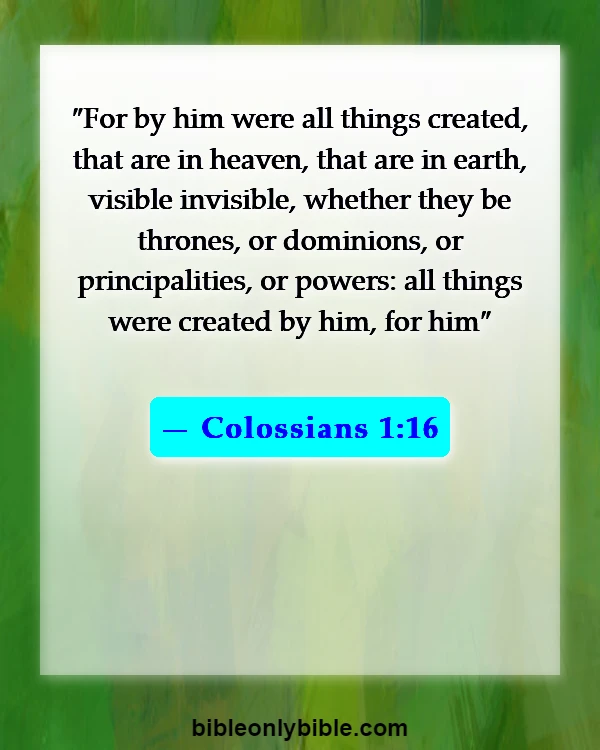
For by him were all things created, that are in heaven, that are in earth, visible invisible, whether they be thrones, or dominions, or principalities, or powers: all things were created by him, for him
Colossians 1:16
Explanation:- Colossians 1:16 highlights that all creation is made through and for Christ, emphasizing the interconnectedness and divine purpose of everything. This verse suggests that caring for the environment honors Christ’s creation and reflects our responsibility to steward the world with respect and gratitude.
Hebrews 1:3 – Christ sustains creation with powerful word

Who being the brightness of his glory, the express image of his person, upholding all things by the word of his power, when he had by himself purged our sins, sat down on the right hand of the Majesty on high
Hebrews 1:3
Explanation:- This verse highlights Christ’s role in sustaining all of creation through His powerful word. It underscores the importance of recognizing our responsibility to care for the environment, as it is continuously upheld by His divine will and authority.
1 Corinthians 10:26 – The earth belongs to the Lord
For the earth is the Lord’s, the fulness thereof
1 Corinthians 10:26
Explanation:- This verse highlights that everything on Earth is God’s creation and belongs to Him. It reminds us of our responsibility to care for the environment as stewards of His creation, emphasizing respect and sustainable use of natural resources in accordance with divine ownership.
Biblical Principles for Protecting Nature and Wildlife
Protecting nature and wildlife is an integral part of our faith journey. The Bible is filled with principles that encourage us to respect and protect all of God’s creatures. By embracing these teachings, we learn to live in harmony with the world around us, advocating for the protection of all life as an expression of our love and gratitude to God.
Proverbs 12:10 – Righteous care for animals reflects a compassionate heart

A righteous man regardeth the life of his beast: but the tender mercies of the wicked are cruel
Proverbs 12:10
Explanation:- This verse highlights the importance of treating animals with kindness and respect, reflecting a compassionate and righteous heart. By caring for wildlife, we honor the Creator’s intent for stewardship and demonstrate our commitment to preserving the environment as part of our spiritual duty.
Job 12:7-10 – Nature teaches God’s sovereignty over life
But ask now the beasts, they shall teach thee; the fowls of the air, they shall tell theeOr speak to the earth, it shall teach thee: the fishes of the sea shall declare unto theeWho knoweth not in all these that the hand of the Lord hath wrought this?In whose hand is the soul of every living thing, the breath of all mankind
Job 12:7-10
Explanation:- In this passage, creation itself is presented as a testament to God’s sovereignty. By observing nature and its creatures, we learn about the divine order and are reminded of our responsibility to protect and care for the environment, honoring God’s intricate design.
Psalm 50:10-11 – God owns and cares for all creation
For every beast of the forest is mine, the cattle upon a thousand hillsI know all the fowls of the mountains: the wild beasts of the field are mine
Psalm 50:10-11
Explanation:- This passage highlights God’s ownership and care for all of creation, emphasizing our responsibility to protect nature and wildlife. As stewards of the earth, we are called to honor God by preserving the environment and ensuring the well-being of all living creatures.
Psalm 104:25-30 – God’s care sustains and renews all creation
So is this great wide sea, wherein are things creeping innumerable, both small great beastsThere go the ships: there is that leviathan, whom thou hast made to play thereinThese wait all upon thee; that thou mayest give them their meat in due seasonThat thou givest them they gather: thou openest thine hand, they are filled with goodThou hidest thy face, they are troubled: thou takest away their breath, they die, return to their dustThou sendest forth thy spirit, they are created: thou renewest the face of the earth
Psalm 104:25-30
Explanation:- This passage highlights how God’s care and provision sustain and renew all of creation. It underscores the interconnectedness of life and our responsibility to protect and cherish nature and wildlife, reflecting divine stewardship and the harmonious balance intended by the Creator.
Isaiah 11:6-9 – Peaceful harmony among all creatures in creation
The wolf also shall dwell with the lamb, the leopard shall lie down with the kid; the calf the young lion the fatling together; a little child shall lead themAnd the cow the bear shall feed; their young ones shall lie down together: the lion shall eat straw like the oxAnd the sucking child shall play on the hole of the asp, the weaned child shall put his hand on the cockatrice’ denThey shall not hurt nor destroy in all my holy mountain: for the earth shall be full of the knowledge of the Lord , as the waters cover the sea
Isaiah 11:6-9
Explanation:- Isaiah 11:6-9 envisions a world where all creatures coexist peacefully, reflecting God’s ideal for creation. This harmonious vision underscores the biblical principle of nurturing and protecting the environment, as it highlights the interconnectedness and balance inherent in God’s creation.
Ezekiel 34:18 – Neglecting nature’s care harms others and the environment
Seemeth it a small thing unto you to have eaten up the good pasture, but ye must tread down with your feet the residue of your pastures? to have drunk of the deep waters, but ye must foul the residue with your feet?
Ezekiel 34:18
Explanation:- This verse highlights the consequences of environmental neglect, illustrating how failing to care for nature can harm others and the ecosystem. It encourages responsible stewardship, reminding us that our actions impact the well-being of both the environment and the community.
How Christians Should Respond to Climate Change According to Scripture
Climate change is a pressing issue, and the Bible offers wisdom on how Christians can respond. Scripture calls us to be proactive in addressing the needs of our planet, reflecting God’s love through our actions. By taking care of the earth, we demonstrate our commitment to living out our faith in a way that honors God and helps others.
Jeremiah 2:7 – God’s land defiled, responsibility to protect creation
I brought you into a plentiful country, to eat the fruit thereof the goodness thereof; but when ye entered, ye defiled my land, made mine heritage an abomination
Jeremiah 2:7
Explanation:- This verse highlights God’s gift of a fruitful land to His people, which they defiled through neglect and misuse. It underscores the responsibility of Christians to care for and protect the environment, aligning with a biblical call to steward creation responsibly in the face of climate change.
Isaiah 24:5-6 – Earth’s defilement due to broken divine laws
The earth also is defiled under the inhabitants thereof; because they have transgressed the laws, changed the ordinance, broken the everlasting covenantTherefore hath the curse devoured the earth, they that dwell therein are desolate: therefore the inhabitants of the earth are burned, few men left
Isaiah 24:5-6
Explanation:- This passage highlights the consequences of humanity’s failure to uphold God’s laws, leading to environmental degradation. It serves as a call for Christians to recognize the importance of caring for creation and responding to climate change through responsible stewardship and adherence to divine principles.
Psalm 104:30 – God renews the earth through His Spirit
Thou sendest forth thy spirit, they are created: thou renewest the face of the earth
Psalm 104:30
Explanation:- Psalm 104:30 highlights God’s ongoing role in renewing and sustaining the earth through His Spirit. This verse encourages Christians to actively participate in environmental stewardship, recognizing that caring for creation aligns with God’s purpose of restoration and renewal for the world.
Romans 1:20 – God’s creation reveals His eternal power and nature

For the invisible things of him from the creation of the world are clearly seen, being understood by the things that are made, even his eternal power Godhead; so that they are without excuse
Romans 1:20
Explanation:- Romans 1:20 highlights how God’s creation reflects His eternal power and divine nature, encouraging Christians to recognize the sacredness of the environment. This understanding calls believers to responsibly care for the earth, viewing stewardship as an act of worship and respect for God’s handiwork.
Revelation 11:18 – God will destroy those who harm the earth
The nations were angry, thy wrath is come, the time of the dead, that they should be judged, that thou shouldest give reward unto thy servants the prophets, to the saints, them that fear thy name, small great; shouldest destroy them which destroy the earth
Revelation 11:18
Explanation:- This verse highlights the importance of stewardship over the earth. It serves as a reminder that God values His creation and holds humanity accountable for its care. Christians are called to actively protect and preserve the environment, aligning their actions with divine expectations.
Bible Verses About Being Good Stewards of Natural Resources
As stewards of God’s creation, we are responsible for managing the natural resources entrusted to us. The Bible provides guidance on using these resources wisely, emphasizing sustainability and conservation. By valuing and conserving what God has given us, we demonstrate our gratitude and ensure these gifts are available for future generations.
Proverbs 27:18 – Care for resources; reap rewards
Whoso keepeth the fig tree shall eat the fruit thereof: so he that waiteth on his master shall be honoured
Proverbs 27:18
Explanation:- Caring for what sustains us, as in tending a fig tree, brings personal benefit. This verse encourages diligent stewardship of natural resources, highlighting that responsible management leads to mutual rewards, both for the caretaker and the community.
Proverbs 28:19 – Hard work leads to abundance, neglect leads to poverty

He that tilleth his land shall have plenty of bread: but he that followeth after vain persons shall have poverty enough
Proverbs 28:19
Explanation:- This verse highlights the importance of diligence and responsibility in stewarding natural resources. By working hard and caring for the environment, we can ensure abundance and sustainability. Neglecting these responsibilities, however, can lead to scarcity and environmental degradation.
Isaiah 5:8 – Warning against greed; preserve land for all
Woe unto them that join house to house, that lay field to field, till there be no place, that they may be placed alone in the midst of the earth
Isaiah 5:8
Explanation:- This verse warns against greed and the consequences of accumulating land at the expense of others. It underscores the importance of being good stewards of the earth, ensuring that natural resources are preserved and accessible for everyone, reflecting a commitment to environmental care and justice.
Matthew 25:21 – Faithful stewardship rewarded with greater responsibilities

His lord said unto him, Well done, thou good faithful servant: thou hast been faithful over a few things, I will make thee ruler over many things: enter thou into the joy of thy lord
Matthew 25:21
Explanation:- This verse highlights the joy and reward of being a faithful steward. In the context of caring for the environment, it encourages us to responsibly manage and protect natural resources, knowing that our dedication will lead to greater responsibilities and blessings.
Luke 16:10-12 – Faithfulness in small matters leads to greater responsibility
He that is faithful in that which is least is faithful also in much: he that is unjust in the least is unjust also in muchIf therefore ye have not been faithful in the unrighteous mammon, who will commit to your trust the true riches?if ye have not been faithful in that which is another man’s, who shall give you that which is your own?
Luke 16:10-12
Explanation:- In this passage, the principle of faithfulness in small matters suggests that when we responsibly manage the resources and responsibilities entrusted to us, including the environment, we demonstrate our readiness for greater responsibilities. It encourages stewardship and accountability in caring for God’s creation.
Deuteronomy 22:6-7 – Care for birds and their nests
If a bird’s nest chance to be before thee in the way in any tree, or on the ground, whether they be young ones, or eggs, the dam sitting upon the young, or upon the eggs, thou shalt not take the dam with the youngBut thou shalt in any wise let the dam go, take the young to thee; that it may be well with thee, that thou mayest prolong thy days
Deuteronomy 22:6-7
Explanation:- This passage highlights the importance of respecting and preserving wildlife, specifically birds and their nests. It promotes a balanced relationship with nature, urging us to act as responsible stewards by ensuring the sustainability of natural resources for future generations.
God’s Command to Preserve and Protect the Earth
From the beginning, God has commanded His people to preserve and protect the earth. This divine mandate is not just a call to action, but an invitation to participate in God’s ongoing creation. By embracing this command, we honor God’s work and show our respect for His creation, ensuring its beauty and bounty continue to bless all living things.
Numbers 35:33-34 – Do not pollute the land; it defiles
So ye shall not pollute the land wherein ye are: for blood it defileth the land: the land cannot be cleansed of the blood that is shed therein, but by the blood of him that shed itDefile not therefore the land which ye shall inhabit, wherein I dwell: for I the Lord dwell among the children of Israel
Numbers 35:33-34
Explanation:- These verses emphasize the importance of maintaining the purity of the land, warning against defilement through violence and pollution. They underscore a divine mandate to protect and preserve the environment, reminding us that the land is sacred and under God’s care.
Ezekiel 34:2-4 – Neglectful shepherds harm, fail to protect the flock
Son of man, prophesy against the shepherds of Israel, prophesy, say unto them, Thus saith the Lord God unto the shepherds; Woe be to the shepherds of Israel that do feed themselves! should not the shepherds feed the flocks?Ye eat the fat, ye clothe you with the wool, ye kill them that are fed: but ye feed not the flockThe diseased have ye not strengthened, neither have ye healed that which was sick, neither have ye bound up that which was broken, neither have ye brought again that which was driven away, neither have ye sought that which was lost; but with force with cruelty have ye ruled them
Ezekiel 34:2-4
Explanation:- This passage highlights the responsibility of leaders to care for their communities, paralleling the call to protect the environment. Just as neglectful shepherds harm their flock, failing to preserve the earth harms creation and future generations, urging us to be diligent stewards.
Psalm 8:6-8 – Dominion over creation, responsibility to steward earth
Thou madest him to have dominion over the works of thy hands; thou hast put all things under his feetAll sheep oxen, yea, the beasts of the fieldThe fowl of the air, the fish of the sea, whatsoever passeth through the paths of the seas
Psalm 8:6-8
Explanation:- This passage highlights humanity’s entrusted role to govern and care for the earth. It underscores our responsibility to steward creation wisely, reflecting God’s intention for us to protect and preserve the environment as caretakers of His magnificent works.
Leviticus 19:9-10 – Leave harvest for the poor and the foreigner
When ye reap the harvest of your land, thou shalt not wholly reap the corners of thy field, neither shalt thou gather the gleanings of thy harvestAnd thou shalt not glean thy vineyard, neither shalt thou gather every grape of thy vineyard; thou shalt leave them for the poor stranger: I am the Lord your God
Leviticus 19:9-10
Explanation:- This passage highlights the importance of sustainable practices and social responsibility. It encourages leaving portions of the harvest for the less fortunate, promoting kindness and stewardship of resources, which aligns with caring for the environment and supporting community well-being.
Biblical Examples of Environmental Conservation and Care
The Bible is full of examples where environmental conservation is practiced and valued. Through these stories, we learn from those who have gone before us, gaining insights on how to care for the world today. These examples inspire us to adopt a lifestyle that reflects God’s love and wisdom, ensuring the earth flourishes for generations to come.
Exodus 23:10-11 – Let land rest, providing for poor and wildlife
Six years thou shalt sow thy land, shalt gather in the fruits thereofBut the seventh year thou shalt let it rest lie still; that the poor of thy people may eat: what they leave the beasts of the field shall eat. In like manner thou shalt deal with thy vineyard, with thy oliveyard
Exodus 23:10-11
Explanation:- This verse highlights the importance of environmental stewardship through the practice of letting agricultural land rest every seventh year. This sabbatical allows the land to rejuvenate, supports the poor through its produce, and provides for wildlife, emphasizing a sustainable and compassionate approach to creation care.
Leviticus 25:1-7 – Land rests every seventh year, promoting renewal
The Lord spake unto Moses in mount Sinai, sayingSpeak unto the children of Israel, say unto them, When ye come into the land which I give you, then shall the land keep a sabbath unto the LordSix years thou shalt sow thy field, six years thou shalt prune thy vineyard, gather in the fruit thereofBut in the seventh year shall be a sabbath of rest unto the land, a sabbath for the Lord : thou shalt neither sow thy field, nor prune thy vineyardThat which groweth of its own accord of thy harvest thou shalt not reap, neither gather the grapes of thy vine undressed: for it is a year of rest unto the landAnd the sabbath of the land shall be meat for you; for thee, for thy servant, for thy maid, for thy hired servant, for thy stranger that sojourneth with theeAnd for thy cattle, for the beast that are in thy land, shall all the increase thereof be meat
Leviticus 25:1-7
Explanation:- Leviticus 25:1-7 highlights the importance of allowing the land to rest every seventh year, promoting ecological balance and renewal. This practice underscores the biblical principle of environmental stewardship, encouraging sustainable land management and acknowledging humanity’s responsibility to care for God’s creation.
2 Chronicles 36:21 – Land rested during exile, fulfilling prophetic sabbath
To fulfil the word of the Lord by the mouth of Jeremiah, until the land had enjoyed her sabbaths: for as long as she lay desolate she kept sabbath, to fulfil threescore ten years
2 Chronicles 36:21
Explanation:- This verse highlights the importance of allowing the land to rest, as it did during the exile, fulfilling the prophetic sabbath. It serves as a biblical example of caring for the environment by respecting natural cycles and ensuring the land’s renewal and sustainability.
Nehemiah 10:31 – Honor sabbath; preserve land’s resources and rest
If the people of the land bring ware or any victuals on the sabbath day to sell, that we would not buy it of them on the sabbath, or on the holy day: that we would leave the seventh year, the exaction of every debt
Nehemiah 10:31
Explanation:- This verse highlights the importance of observing the Sabbath, which includes allowing the land to rest. By refraining from agricultural activities on the Sabbath, it underscores the biblical principle of environmental conservation, ensuring the land’s resources are preserved and rejuvenated.
Jonah 4:11 – God’s care extends to all creation
Should not I spare Nineveh, that great city, wherein are more than sixscore thousand persons that cannot discern between their right hand their left hand; also much cattle?
Jonah 4:11
Explanation:- In this verse, God highlights His compassion for all creation, including the people and animals of Nineveh. It underscores the biblical call to care for the environment, reflecting God’s concern for the well-being of every part of His creation.
Psalm 65:9-13 – God’s provision nourishes and enriches the earth
Thou visitest the earth, waterest it: thou greatly enrichest it with the river of God, which is full of water: thou preparest them corn, when thou hast so provided for itThou waterest the ridges thereof abundantly: thou settlest the furrows thereof: thou makest it soft with showers: thou blessest the springing thereofThou crownest the year with thy goodness; thy paths drop fatnessThey drop upon the pastures of the wilderness: the little hills rejoice on every sideThe pastures are clothed with flocks; the valleys also are covered over with corn; they shout for joy, they also sing
Psalm 65:9-13
Explanation:- This passage beautifully illustrates God’s care for the earth, highlighting His role in providing water and fertility, ensuring abundant harvests, and sustaining life. It serves as a reminder of our responsibility to steward and protect the environment, reflecting divine compassion and generosity.
